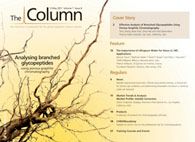Looking for biomarkers
The Singapore Eye Research Institute will advance biomarker candidates that it has identified for chronic inflammatory eye conditions into large-scale clinical trials for validation using AB SCIEX technology.

The Singapore Eye Research Institute will advance biomarker candidates that it has identified for chronic inflammatory eye conditions into large-scale clinical trials for validation using AB SCIEX technology. The institute plans to use the TripleTOF 5600 system to accelerate the process to develop a clinical test to significantly improve understanding of inflammation of the eye. This information is expected to help develop methods for improved diagnosis and pharmacological treatments of dry eye and other eye conditions. The institute is also using the Eksigent nanoLC-Ultra and cHiPLC-nanoflex chromatography technology.
“New innovations in the diagnosis and measurement of the response to treatment of chronic eye conditions offer hope to all the millions of patients who suffer from these eye diseases,” said Roger Beuerman, head of the Proteomics Research Group and senior scientific director at the Institute. “Our eye research institute invested in leading-edge technology to boost our capabilities to improve the understanding of eye diseases and speed up development of new ways to treat these conditions.”
Objective clinical tests to accurately measure the severity of dry eye syndrome and preclinical evaluation of new pharmacological therapies currently do not exist. The institute is currently attempting to identify and verify six biomarker candidates associated with dry eye syndrome.
For more information on the system visit www.absciex.com
This story originally appeared in The Column. Click here to view that issue.

.png&w=3840&q=75)

.png&w=3840&q=75)



.png&w=3840&q=75)



.png&w=3840&q=75)











